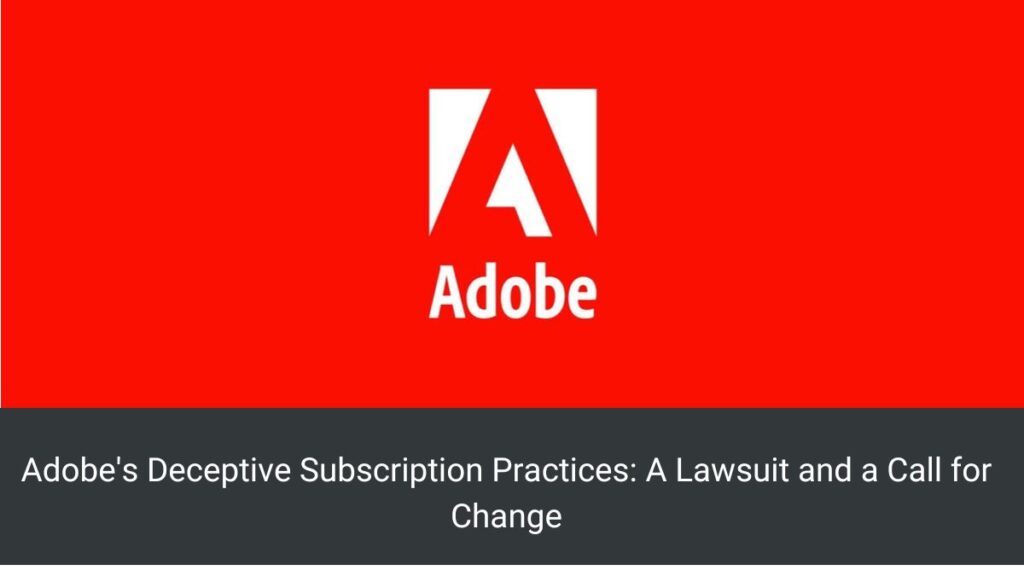The Lawsuit: Unraveling Adobe’s Alleged Misconduct
The recent lawsuit filed by the US Department of Justice (DOJ) against Adobe has brought to light several concerning practices allegedly employed by the software giant. According to the complaint, Adobe has been accused of deceiving customers by obscuring important subscription terms, imposing exorbitant termination fees, and creating a labyrinth of obstacles for those seeking to cancel their subscriptions.
The Fine Print Fiasco
At the heart of the allegations lies Adobe’s purported failure to clearly disclose the terms of its annual, paid monthly subscription plan. The DOJ claims that these critical details are hidden in the “fine print and behind optional textboxes and hyperlinks.” Consequently, customers are allegedly left unaware of the substantial early termination fees they may face, which can amount to hundreds of dollars.
The Cancellation Conundrum
The lawsuit further alleges that Adobe has made the cancellation process unnecessarily “onerous and complicated.” Customers attempting to cancel their subscriptions are allegedly required to navigate through multiple webpages and pop-ups, only to be “ambushed” with the aforementioned early termination fees – a tactic that may discourage them from proceeding with the cancellation.
Moreover, the DOJ contends that even when customers seek to cancel their subscriptions via phone or live chat, they encounter similar obstacles. The complaint alleges instances where calls or chats were abruptly disconnected, forcing customers to re-explain their reasons for cancellation upon reconnection.
The Impact: A Creative Community Constrained
Adobe’s subscription model, which replaced the company’s previous practice of selling software for lifetime use, has long been a source of frustration for creative professionals. Photographers, graphic designers, and other creatives often find themselves trapped in a cycle of subscription renewal, as their livelihoods depend on continued access to Adobe’s suite of products, including industry standards like Photoshop, Illustrator, and InDesign.
A Personal Anecdote: The Struggle of a Freelance Designer
As a freelance graphic designer, I can attest to the challenges posed by Adobe’s subscription model. While the software remains indispensable for my work, the recurring monthly or annual fees can strain my budget, particularly during leaner periods. On multiple occasions, I have contemplated canceling my subscription, only to be deterred by the prospect of navigating a convoluted cancellation process and facing exorbitant termination fees.
A Call for Transparency and Consumer Protection
The DOJ’s lawsuit against Adobe is a welcome step towards protecting consumer rights and ensuring transparency in the realm of software subscriptions. As the digital landscape continues to evolve, it is crucial for companies to prioritize clear communication and ethical business practices.
The Need for Accessible and Understandable Terms
Consumers have a right to be fully informed about the terms and conditions of the products and services they purchase. By allegedly obscuring crucial details in fine print and optional hyperlinks, Adobe is accused of violating this fundamental principle. Transparency should be the cornerstone of any subscription model, empowering consumers to make informed decisions based on a comprehensive understanding of the associated costs and commitments.
Simplifying the Cancellation Process
Furthermore, the alleged hurdles faced by customers seeking to cancel their subscriptions highlight the need for streamlined and user-friendly cancellation processes. Customers should not be subjected to frustrating mazes of webpages, pop-ups, or disconnected phone calls when exercising their right to terminate a service. Clear and accessible cancellation procedures are not only ethical but also essential for fostering trust and maintaining positive customer relationships.
Regulatory Oversight and Industry Accountability
The DOJ’s lawsuit against Adobe serves as a reminder of the critical role played by regulatory bodies in safeguarding consumer interests. As companies continue to explore innovative business models, it is imperative that they operate within the boundaries of consumer protection laws and face appropriate consequences for any violations.
Additionally, this case underscores the importance of industry accountability and self-regulation. Companies like Adobe, which wield significant influence in their respective markets, have a responsibility to lead by example and uphold the highest standards of transparency and ethical conduct.
A Call for Change and a Brighter Future
As the creative community and consumers at large grapple with the implications of Adobe’s alleged deceptive practices, it is essential to view this lawsuit as a catalyst for positive change. By shedding light on these issues, the DOJ has issued a clarion call for greater transparency, accountability, and consumer protection in the realm of software subscriptions.
While the legal proceedings unfold, it is incumbent upon Adobe and other industry leaders to reevaluate their practices and prioritize the interests of their customers. By embracing transparency, simplifying cancellation processes, and fostering an environment of trust and ethical conduct, companies can forge stronger relationships with their customer base and pave the way for a more equitable and consumer-friendly future.
Ultimately, this lawsuit serves as a reminder that the pursuit of profit must never come at the expense of consumer rights and ethical business practices. As we navigate the ever-evolving digital landscape, it is crucial that we hold companies accountable and demand transparency, fairness, and respect for the consumers who have entrusted them with their hard-earned dollars and creative aspirations.

